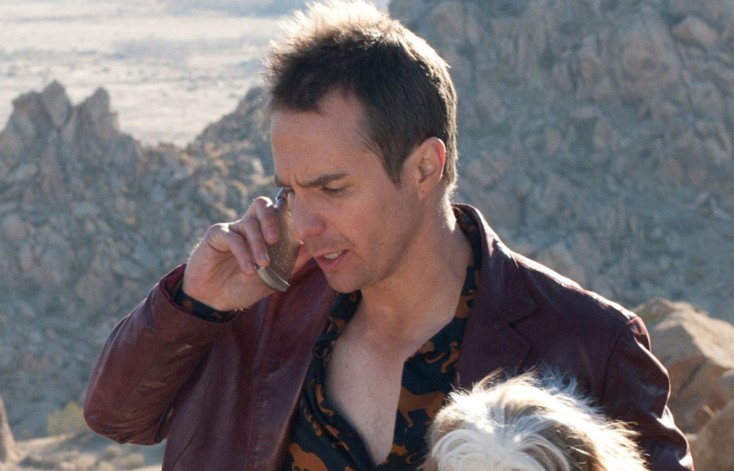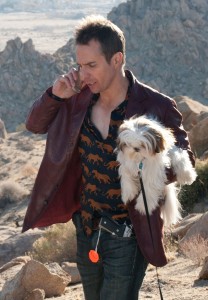By ANGELA DAWSON
Front Row Features
HOLLYWOOD—It’s difficult to steal scenes in a film that boasts famed scenery chewers Colin Farrell, Woody Harrelson and Christopher Walken, yet Sam Rockwell manages to do just that in the dark comedy “Seven Psychopaths.”
Rockwell, known for playing offbeat characters, including his dead-on portrayal of TV game show host Chuck Barris in George Clooney’s “Confessions of a Dangerous Mind,” stars as Billy, the loyal but completely bonkers friend of blocked Hollywood screenwriter Marty (played by Farrell). Billy wants to help his friend write a screenplay, titled “Seven Psychopaths,” but the writer is reluctant. While waiting for inspiration to strike, the duo get involved in a dognapping gone wrong, and wind up fleeing to the Southern California desert to escape an angry mobster (Harrelson) who wants his beloved Shih Tzu back, no matter what it takes.
Rockwell, 43, previously teamed with “Seven Psychopaths” writer-director Martin McDonagh on the Broadway play “A Behanding in Spokane,” which also starred Christopher Walken, who also stars in “Seven Psychopaths.”
The veteran actor recently sat down to talk about his latest role and working again with McDonagh and Walken and playing a psychopath.
Q: Did you see anything about the character that reflected Martin?
Rockwell: Certainly Colin’s character did.
Q: Did your reading of the script match what came out on screen?
Rockwell: Kind of. I guess it’s just surprising when you can pull it off. It was an ambitious movie. The thing I was concerned about (were the scenes of) the guys in the desert, the guys being me, Colin and Chris, talking about our feelings. I was a little concerned that we were going to lose the audience, until the next explosion came, and I was really taken with how it didn’t lose me in the first screening that I saw. I was worried about that, and I was impressed that did not happen.
Q: Where did Billy go off the rails?
Rockwell: He’s kind of off the rails from the get go. (He laughs.)
Q: What got him to that point?
Rockwell: He’s a lot like the Chazz Palminteri’s character in “Hurlyburly.” He’s a frustrated actor. The relationship between Colin and me is very similar to the relationship Sean Penn and Chazz had in that movie.
Q: You work with some accomplished actors in this: Christopher Walken and Woody Harrelson, for example.
Rockwell: Chris brings a cache, or maybe “legacy” is a better word. The films that we’ve seen Chris do where he’s scary, whether it’s “At Close Range” or “True Romance,” I think that adds up to him playing Hans (in “Seven Psychopaths”). It’s such a brilliant casting choice. He doesn’t have to work so hard to be scary because we already have that from his other films.
Q: How was it working with Colin Farrell and Tom Waits?
Rockwell: Awesome. There’s an exchange of status. Colin is giving us status, and then Tom Waits is giving Colin status at the end of the movie. It’s like in the movie “The Master,” Joaquin (Phoenix) giving Philip Seymour Hoffman status, or vice versa. An exchange of status I think that’s important. I’m giving status to Colin’s character in the beginning. He’s the alpha in the beginning and then we switch a little.
Q: Do you think your character Billy has a death wish?
Rockwell: A little bit, yeah. There’s a little bit of that “Zoo Story” kind of thing, (Edward) Albee’s “The Zoo Story,” where he wants to get the guy to stab him a little bit. Maybe there was a little bit of that with (Billy) and Woody Harrelson’s character.
Q: After you did McDonagh’s Broadway play, did you immediately say, “That’s great. Let’s do it again?”
Rockwell: Not until the end of the play’s run. (McDonagh) gave me the script at the very end of the production, shortly after he gave it to Chris or maybe a while after. I know that I’d taken a glimpse at it about four or five years previous when I was maybe going to do (another McDonagh’s (play) “The Pillowman.” I know Colin looked at it during “In Bruges.” I was reading it on the toilet or something like that, and (I said to McDonagh), “I hope you get a green light for that. I hope that works out, and when it does, call me. Yeah! I’d love to be a part of that.” You kind of want to know if it’s real.
Q: The film’s called “Seven Psychopaths,” but Chris’ character isn’t really a psychopath in true sense. He has a strong connection with his wife.
Rockwell: Yeah, but we take a little poetic license in this film. The typical psychopath does not have empathy and some of these characters do. If you look up “psychopath” in the dictionary, I don’t know if you’ll see Billy and Hans. It’s not (noted serial killer Jeffrey) Dahmer, know what I mean?
Q: Can you talk about working with Bonny (the Shih Tzu)?
Rockwell: She was a great dog and wasn’t noisy. A lot of those little dogs can be noisy. She was really quiet and really well behaved. It was really incredible. We got her to do that paw thing at the end. She’s pretty amazing.
Q: You didn’t have to do a lot of takes with her?
Rockwell: Not as much as normally. I’ve worked with a lot of dogs and it can be hard.
Q: Do you have a pet?
Rockwell: I have a dog.
Q: Do you find yourself going back to theater work because you have to find something fresh or something inspires you eight days a week?
Rockwell: Absolutely. The stage is a gymnasium for an actor to work muscles you don’t get to work (in film). But this film is very theatrical. It has monologues and is a dialogue-driven film so it’s not your usual film. It’s like a Charlie Kaufman or Quentin Tarantino or a David Mamet; it’s got meaty scenes. So it’s theatrical.
Q: Is it shocking to you to meet an actor in Hollywood who’s done 30 successful films and yet has never stepped onto a stage?
Rockwell: Yeah, but there are exceptions. We don’t have the same apprenticeship actors like Chris did in the ‘70s with theater (director) Joe Papp, or like they do in England. It’s different now. People get famous very early. And that’s sad to me. I started out in the theater in San Francisco as a kid, and there was kind of an apprenticeship. I studied acting so I think there’s a great deal of value in that.






